| Srl | Item |
| 1 |
ID:
112915
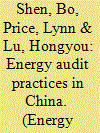

|
|
|
|
|
| Publication |
2012.
|
| Summary/Abstract |
China set an ambitious goal of reducing its energy use per unit of GDP by 20% between 2006 and 2010. Much of the country's effort is focused on improving the energy efficiency of the industrial sector, which consumes about two-thirds of China's primary energy. Industrial energy audits are an important part of China's efforts to improve its energy intensity. Such audits are employed to help enterprises identify energy-efficiency improvement opportunities and serve as a means to collect critical energy-consuming information. Information about energy audit practices in China is, however, little known to the outside world. This study combines a review of China's national policies and programs on energy auditing with information collected from surveying a variety of Chinese institutions involved in energy audits. A key goal of the study is to conduct a gap analysis to identify how current practices in China related to energy auditing differ from energy auditing practices found around the world. This article presents our findings on the study of China's energy auditing practices at the national and provincial levels. It discusses key issues related to the energy audits conducted in China and offers policy recommendations that draw upon international best practices.
|
|
|
|
|
|
|
|
|
|
|
|
|
|
|
|
| 2 |
ID:
116730
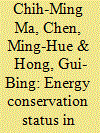

|
|
|
|
|
| Publication |
2012.
|
| Summary/Abstract |
The food industry in Taiwan is labor intensive, the cost of raw materials is high, and there is much product diversification. Although this industry is primarily small and medium scale, it is a large user of electricity in Taiwan's manufacturing sector. The concentration of greenhouse gases (GHGs) from manufacturing activities and vehicle emissions has increased remarkably. Energy audits are a basic and direct means by which energy efficiency can be improved, energy consumption reduced, and carbon dioxide emissions inhibited. This work summarizes the energy saving potential of 76 firms and the energy savings implemented by 23 firms as determined by energy audit tracking and from the on-line energy declaration system in Taiwan's food industry. The results of this study can serve as a benchmark for developing a quantified list in terms of potential energy savings and opportunities for improving the efficiency of the food industry.
|
|
|
|
|
|
|
|
|
|
|
|
|
|
|
|
| 3 |
ID:
116423
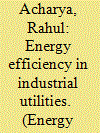

|
|
|
| 4 |
ID:
116422
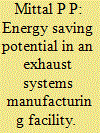

|
|
|
| 5 |
ID:
132671


|
|
|
|
|
| Publication |
2014.
|
| Summary/Abstract |
In the objective of reaching the "nearly zero-energy buildings" target set by the European Union, municipalities cover a crucial role in advocating and implementing energy-efficient measures on a local scale. Based on a dataset of 322 municipalities in Northern Italy, we carried out a statistical analysis to investigate which factors influence the adoption of energy efficiency in municipal buildings. In particular, the analysis focuses on four categories of factors: (i) capacity building for energy efficiency, (ii) existing structure and competences for energy efficiency, (iii) technical and economic support for energy efficiency, and (iv) spill-over effect caused by adoption of "easier" energy-efficient measures. Our results show that capacity building through training courses and technical support provided by energy audits affect positively the adoption of energy efficiency in municipal buildings. The size of the municipal authority, the setting of local energy policies for residential buildings and funding for energy audits are not correlated with energy efficiency in public buildings, where the "plucking of low hanging fruit" often prevails over more cost-effective but long-term strategies. Finally, our results call for the need to promote an efficient knowledge management and a revision of the Stability and Growth Pact.
|
|
|
|
|
|
|
|
|
|
|
|
|
|
|
|
| 6 |
ID:
124372


|
|
|
|
|
| Publication |
2013.
|
| Summary/Abstract |
The cement industry represents one of the most energy intensive sectors in Taiwan. Energy audits are the direct tools which are employed to help reduce energy consumption. The objectives of energy audits are to establish energy audit systems, provide on-site energy audit service and reduce production cost. This study summarized the energy savings implemented in Taiwan's cement industry; the data were obtained from the on-line Energy Declaration System in 2010. The total implemented energy savings amounted to 68,512 kilo liter of crude oil equivalent (KLOE). The energy audit group audited seven Taiwanese cement plants in 2011 and revealed an energy saving potential of 2571.6 MWh of electricity and 1002.8 KLOE of thermal energy. The total potential energy saving was 1708.5 KL of crude oil equivalent (KLOE), equivalent to a 4560 t reduction in CO2 emissions, representing the annual CO2 absorption capacity of a 122 ha forest plantation.
|
|
|
|
|
|
|
|
|
|
|
|
|
|
|
|
| 7 |
ID:
162967
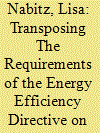

|
|
|
|
|
| Summary/Abstract |
Energy audits and energy management systems are recognized as important instruments to improve energy efficiency. By introducing Article 8 of its Energy Efficiency Directive (EED) the European Commission has made regular energy audits an obligation for large companies. Its transposition into national legislation by the EU-28 Member States (MS) results in different national implementations. The aim of this paper is to analyze differences and communalities in the national requirements and to derive good practice for policy makers from these. We structure the implementation process according to the theoretical concept of Policy Cycle Analysis and apply it as a heuristics from a multi-level governance perspective. The empirical analysis is based on a review of national implementation documents and 30 semi-structured interviews with stakeholders involved in the process of Article 8 EED. The transposition was delayed in more than half of the 28-EU MS. Our findings suggest that the interlinkages of the policy cycles are particularly important for a smooth policy process as MS partly interpreted the requirements differently. Further research on an updated, in-depth analysis of the correctness of the transposition as well as research on the impact of energy audits and energy management systems induced by the regulation is needed.
|
|
|
|
|
|
|
|
|
|
|
|
|
|
|
|